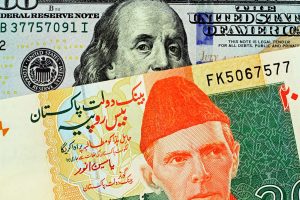Pakistan’s worsening economic situation amid its continuing political turmoil is critical and calls for bold and timely action by policymakers. The economic crisis has adversely affected its human development indicators, including poverty, education, health, gender equality, and environmental sustainability.
High inflation, a weakening currency, and dangerously low foreign exchange reserves, along with the high cost of doing business, have intensified the grim economic outlook. In its latest report, Moody’s Investor Service has warned of a possible default as $7 billion in repayments are due in the coming months.
The economic crisis could deepen if the International Monetary Fund (IMF) bailout is delayed further as foreign exchange reserves are at a historical low. Total foreign reserves stand at $9.82 billion with the State Bank of Pakistan holding only $4.24 billion, which is enough to pay for just three weeks of imports.
The current account deficit is expected to soar from the current level of $3.86 billion as import restrictions have been lifted after many months. Food and fuel prices are soaring with the weekly inflation outlook standing at 45.4 percent while the currency depreciates.
Pakistan’s economic troubles have sparked a heated debate over the root of the crisis, and whether external partners will rescue the country from its financial distress once again.
The IMF loan of about $1.1 billion will only be disbursed only if the country implements tough reforms, such as increasing taxes, reducing subsidies, keeping the exchange rate market-based, strengthening central bank independence, overhauling corporate taxation, improving governance of state-owned enterprises, and enhancing efficiency and regulation in the power sector to overcome a trust deficit.
These measures could lower disposable income, curb consumption and investment, and fuel inflation. In addition, the hold-up of the IMF funds could dent investor confidence and weigh down the country’s growth prospects, which could worsen the economic situation. As a result, the poor may face difficulties in accessing basic necessities such as food, healthcare, education, and shelter due to the economic crisis.
The 2023 bailout tranche under the 9th review of the IMF program may offer some respite, but it is crucial to ensure that the cost of economic reforms is shared fairly and that social protection programs are enhanced to shield the most vulnerable.
Even though technical-level talks between Pakistan and the IMF have been completed, staff-level agreement remains suspended. The IMF remains concerned about the government’s decisions to borrow directly from banks as this can escalate the fiscal deficit substantially besides initiating another debt circle. Moreover, the Fund has demanded details on fuel subsidies worth $528.5 million that were recently announced by the government. Reportedly, the initial proposal has been declined while the finalization of the agreement is now subjected to financial assurances of $3 billion from Saudi Arabia and the United Arab Emirates.
The government is continuously trying to secure its political capital; however, the delay is costing them more. In addition, the IMF has also linked the staff-level agreement with assurances from friendly countries for foreign assistance. Besides, it is keen to ensure that Pakistan’s balance of payments deficit is fully financed for the fiscal year ending in June. The delay is also hampering Pakistan’s ability to tap external financing, which is increasing the pressure further.
In response to the prior policy actions demanded by the IMF, the State Bank of Pakistan hiked interest rates to 20 percent, due to which millions of Pakistanis are struggling to pay for necessities, especially three meals a day.
Unfortunately, these reforms are likely to negatively impact the socioeconomic conditions of the country, particularly for the poor and middle class. The government must make sure that the reforms are efficient and fair, and that they do not worsen the situation of the most vulnerable groups in society. Pakistan can achieve sustainable economic growth and development through these efforts.
Political uncertainty, a global economic meltdown, and a shift in a geopolitical framing also pose a threat to Pakistan’s market sentiment. Fiscal adjustments and exchange rate depreciation have led to a significant deterioration in the near-term economic outlook and a further upward drift in inflation expectations.
Pakistan’s inherent structural issues are a major impediment to sustainability. The economy has also been severely impacted by import restrictions due to the lack of indigenous manufacturing. Large-scale manufacturing plants are at risk of shutting down due to a shortage of raw materials and intermediate inputs.
Export-led growth is not an easy solution, as price and quality competitiveness require investment in research and development. The country’s textile associations have blamed the government for their economic problems, but they have also neglected to invest and improve their own inefficiency without government protection.
Pakistan has agreed to impose taxes worth $599 million to reduce fiscal deficits and increase revenue, in line with the IMF program. These measures are expected to increase revenue and reduce fiscal deficits. However, these measures are likely to have a negative impact on socioeconomic conditions, as they will increase inflation, reduce disposable income, and affect consumption and investment.
While the IMF program offers crucial support, without structural reforms like tax and social protection reforms, it will not be enough to ensure long-term stability and inclusive growth. Delaying the IMF program has negatively affected investor confidence, increased inflation, and hindered growth prospects. Pakistan must act quickly to secure the bailout loan and mitigate the socioeconomic effects of the crisis.
Pakistan’s economic crisis, including its high inflation, low growth, and declining foreign reserves, requires a comprehensive reform agenda that addresses both short-term stabilization and long-term structural issues. The IMF highlights the need to expand social safety nets and improve the performance of state-owned enterprises and governance.

































